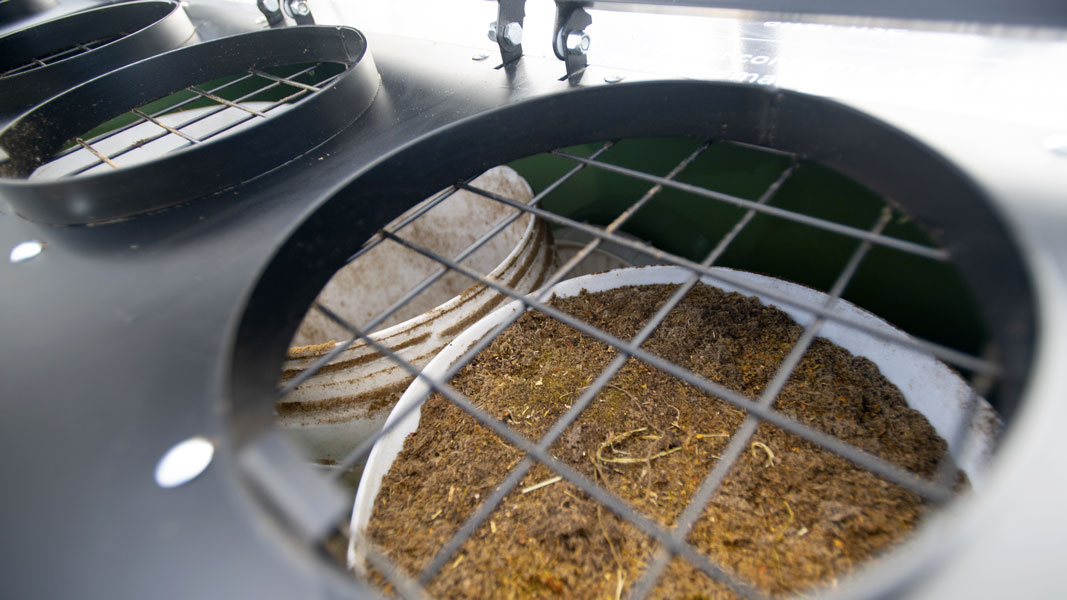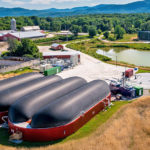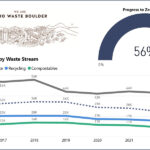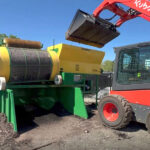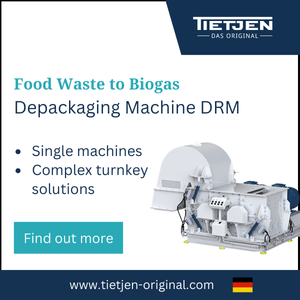Top: Dehydrated household food waste, visible in container inside the drop-off bin. Photo by Steve Ogle
Nora Goldstein
The City of Nelson, British Columbia (pop. 11,467), located in the Selkirk Mountains in the southeastern region of the Canadian province, has embarked on a new approach to household food waste diversion. In mid-2023, the city launched the pilot phase of its Pre-Treated Organics Program that involves distributing city-owned countertop food waste dehydrators to a targeted neighborhood as well as to a group of residents throughout Nelson who signed up for the program. “This process, known as ‘pre-treatment,’ significantly reduces the weight and volume of food waste,” notes the city’s website, stating that “the innovative program marks the beginning of Canada’s first residential pre-treated organics initiative.”
The primary motivations for the launch of the initiative are to meet households’ desire for an organics diversion program, identify a solution with the smallest greenhouse gas (GHG) emissions footprint, and address significant concerns related to wildlife attraction. In December 2020, the City of Nelson adopted a comprehensive climate change action plan entitled Nelson Next. A key priority within Nelson Next is to “deliver a city-wide, cost-effective, organics diversion program.” Nelson does not offer curbside organics collection, and food waste is landfilled with the trash stream.
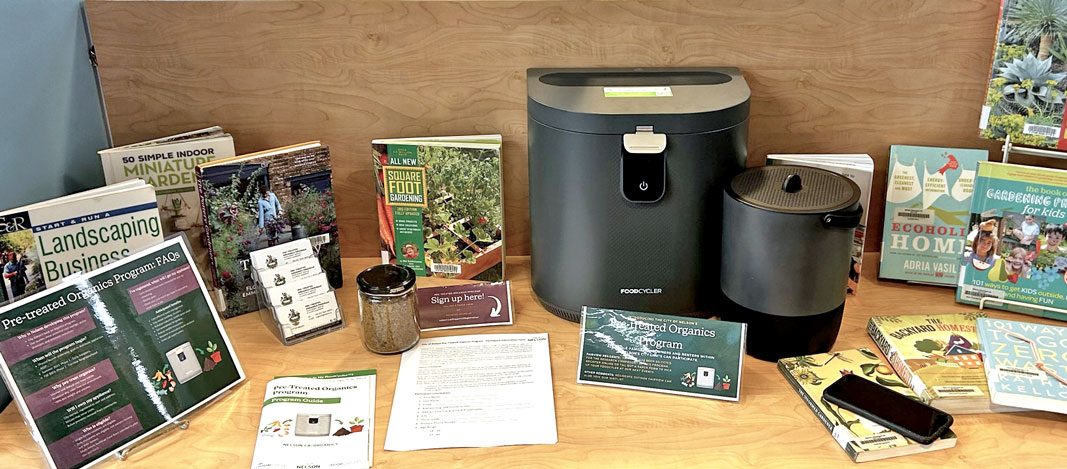
Display of the FoodCycler™ (center), along with instructions on its use, and gardening books. Photos courtesy City of Nelson
Among the alternatives to curbside collection was food waste pretreatment. To test the concept, Nelson facilitated a small-scale pilot project with household food waste dehydrators in 2020; 151 households signed up to participate. A smaller group of 31 randomized households were also requested to participate in the pilot to collect unbiased opinions. The FoodCycler™ dehydrator was selected and households purchased the unit at a discounted price and received a $125 (Cdn) rebate at the end of three months of participating. “The average household size was 2.73 people, and 86% lived in single-family homes,” explains Emily Mask, the City of Nelson’s Climate ProgramsCoordinator. “About 40% of these households were composting in their backyards but had issues with pests and rodents and increasingly with wildlife such as bears. Roughly 15 metric tons (16.5 tons) of food waste were recycled in the units.” Most pilot participants used the dried and ground output in their gardens.
Feasibility Study, Pilot Scope
Encouraged by the results, the city conducted a feasibility study to evaluate moving forward with a pretreated organics program versus rolling out weekly curbside organics collection. The feasibility study report, released in October 2022, summarizes key findings. These included an estimated greater reduction in GHGs than a weekly curbside organics program due to the transportation emissions that result from weekly hauling; higher annual average food waste diversion than curbside collection based on a regional benchmark rate of 120 kg/household/year (primarily food waste); and a more cost-effective program based on preliminary cost estimates of avoided weekly collection trips. “The feasibility study showed favorable results and the Nelson City Council decided to move forward with the current pilot program,” says Mask. “However, the true test and scalability of a project like this — from both a financial and environmental lens — will only be accurate through the pilot study that we are conducting now. We are planning to assess the cost per ton of organics diverted to thoroughly evaluate the expenditure. Many municipalities have done pilot projects like this and yielded the same results. But the only truly compelling stats we’ll be able to report widely are to come.”
A bid was issued for procurement of 1,600 in-home food waste dehydrators. Food Cycle Science won the bid, and supplied its Eco5 FoodCycler™, with capacity to process 5 liters (1.3 gallons) of food waste/batch. The countertop unit is 13.5 inches x 10.9 inches x 13.8 inches and is rated to use 1.5 kWh/cycle. Most food scraps, including small bones, can be added to the device; some pre-cutting is required for corn cobs and husks, whole vegetables, and fibrous plants. The only food item that cannot be added is beef bones. The retail cost of the Eco5 is $799.95 (Cdn). The city’s cost to purchase the 1,600 appliances and the administration of the program is $1,061,440. The City of Nelson received $682,720 in grant funding for the pilot, including a $395,700 investment by the Federation of Canadian Municipalities’ Green Municipal Fund. Other funders include Environment and Climate Change Canada and Columbia Basin Trust. The remaining $378,720 is coming from the city’s funds held in reserve for recycling and/or equipment.
Pilot In Targeted Neighborhood
Single-family households in Nelson (about 4,400 in total) receive biweekly trash and recycling collection. Garbage bag tags, which are affixed to the trash bags when set out at the curb, are sold for $2 each by the city. Apartment building waste is picked up by local contracted haulers that service businesses and institutions. Nelson officials selected the neighborhood of Fairview, which has Friday trash collection, to begin the roll out. It also selected a 49-unit apartment building in that neighborhood to test use of the devices in a multi-family setting.
Before deploying units in the Fairview neighborhood, the city opened enrollment to residents throughout the city, limiting the number of devices distributed to 500. “We labeled this cohort our ‘early adopter’ group, and it gave our staff the opportunity to ‘road test’ our educational sessions and training program, the effectiveness of the resources we created, do any troubleshooting needed with the appliances, and work out the logistics of home deliveries,” explains Mask. “That program began in June 2023.”
The City of Nelson owns the FoodCycler™ appliances and enacted a bylaw in May 2023 — Waste Management and Wildlife Attractant Bylaw — to “provide for and regulate the collection, storage and disposal of garbage and trade waste within the City of Nelson and to control wildlife attractants.” Wildlife includes bears, cougars, coyotes and wolves, and has become an increasing problem over the past several years, with wild animals venturing into neighborhoods seeking food. (This resulted in decreased use of backyard composting bins.) The bylaw states that households must “ensure the Pre-treatment Appliance remains at the address authorized by the City; keep the Pre-treatment Appliance in working condition and use it in accordance with the directions provided; be responsible for the costs of electricity in using the unit; and if relocating to another address, leave the Pre-treatment Appliance at the authorized address unless directed otherwise by the City Engineer.”
Outreach for pilot participants in the Fairview neighborhood, including mailers and door-to-door promotion, resulted in 76% of Fairview households (currently 707 out of 928 eligible dwellings in Fairview with a Friday waste collection route) choosing to have a pretreatment appliance. “There’s been a learning curve about what food waste can go into the appliance,” adds Mask. “We get a lot of questions about avocado pits!”
Managing The Output

Guidelines on home usage of the dehydrated food waste emphasize that the material is not finished compost and cannot be used like compost.
The educational materials emphasize that the dehydrated food waste (described as a “nutrient-rich soil amendment” in the Pre-Treated Organics Program Guide) can still be a wildlife attractant. Households are instructed to keep the dried output in an airtight container and to use it in their gardens according to the guidelines provided. “It is important to note that although the soil amendment is in the early stages of decomposition, it still needs to mature and it does not have the same characteristics as finished compost,” states the guidance. “You can either add it directly to your soil before planting or further process it in a home composter. … Keep in mind that animals may still be interested in the soil amendment until it’s fully composted, so we must remain vigilant in how we handle and store it.”
Mask adds that when using the output at home, residents should monitor it for pest issues. “If they have a batch that has a lot of meat in it, they are instructed to use it sparingly,” she says. “We’ve made an effort to ensure that households have the right information and are insistent that every resident with a device watch the tutorial video before setting up their unit.”
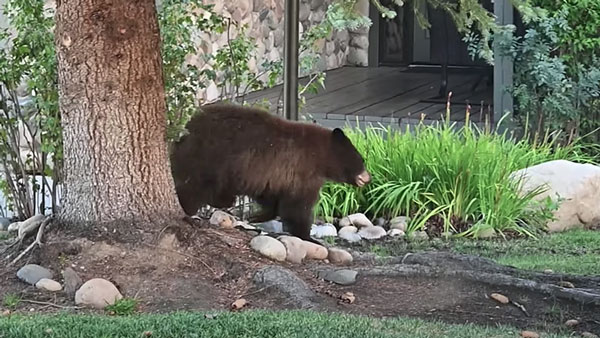
Wildlife, such as bears, have been a deterrent to backyard composting.
Because the dehydrators were distributed to residents during the winter months, data on household usage of the output in their gardens or incorporating it into backyard bins is not yet available. The city set up two drop-off locations where the output can be taken; households are given the lock combination to access the drop-off containers. Once enough material has accumulated, the city transports it to the regional composting facility. If the program is adopted city-wide, one option to be evaluated is providing households with a special container in which to put the soil amendment at curbside for pick-up. In the interim, the options are to use it at home or bring it to one of the drop-off locations.
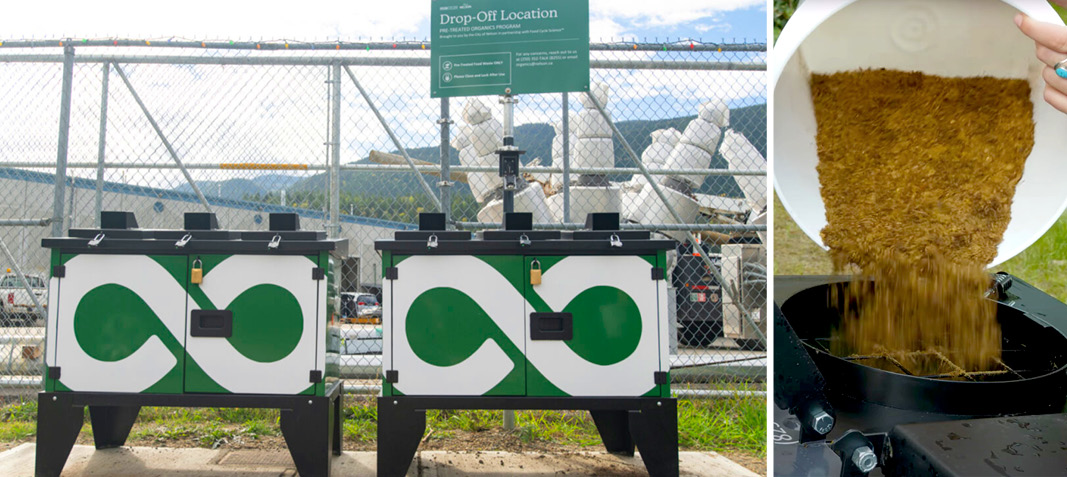
The city established two drop-off locations where residents can bring their dehydrated food waste instead of using it in their gardens and landscapes, or adding it backyard composters. Collected material is composted at a regional facility. Photos by Steve Ogle and courtesy City of Nelson
Nelson has been working alongside the Regional District of Central Kootenay (RDCK) to incorporate the pretreated material into its Regional Compost Facility that uses an aerated windrow system. The RDCK is the first composting facility in Canada to embark on processing this material on a municipal scale.
Evaluating Pilot Performance, Quantifying Diversion
One of the measures of household usage of the food waste dehydrator is the reduction in trash volumes tipped at the city’s transfer station. “If we measure a decrease, then the pilot is successful,” says Mask. Other indicators include a decrease in the number of garbage tags sold per year per household, the volume of the pretreated organics collected, and doing waste audits in households in the pilot neighborhood using verifiable industry standards.
The City of Nelson contracted with Yarrow Environmental and Transform Waste to conduct an independent comparative analysis of Nelson’s approach versus more traditional curbside wet food waste collection. “We are in the early stages of our data analysis,” noted Shannon Ripley, principal of Yarrow Environmental, in mid-February, adding that the comparison report is part of the scope of work for the grant funding Nelson received. “We are comparing a set of diversion, technical, social and environmental parameters between a pretreated organics program and a wet food scraps collection program.”
Ripley outlined the core components of the assessment:
- Quantity of organics diverted through each approach. The city did waste audits at a set number of houses prior to distribution of the FoodCyclers and has issued a request for proposals to conduct a post-implementation audit at the same homes. The initial audit measured edible and inedible food, compostable paper (torn up napkins and paper towels can be put in the device), and garden waste. Yarrow Environmental will compare that data to audit data from a curbside organics collection program.
- Environmental assessment based on GHG emissions. “This assessment is a very important component for our analysis, as the City of Nelson wants to select a method to implement citywide that results in the lowest emissions,” explains Ripley. “Along with calculating collection-related emissions, we are factoring in embodied GHG emissions from manufacturing and distribution of the FoodCycler, and embodied emissions for the collection vehicles and transportation.”
- Technical elements of the pilot program, including logistics related to the drop-off sites, monitoring appliance repairs and even storage requirements for managing the shipment from the manufacturer.
- Social indicators, measured by surveying households in the pilot. “An upcoming survey will capture user experiences, frequency of usage of the device, perceived barriers to using it, including what can and cannot be processed, and overall level of satisfaction,” adds Ripley.
What is more challenging to quantify is usage of the dehydrated food waste at home, versus what is brought to the drop-off bins. “We won’t be able to measure that, and the waste audit will be the only way to quantify how much households are using the appliance,” she notes. Ripley anticipates having the assessment completed this summer.
The Nelson City Council will use the report and the results of the waste audit to determine if the Pre-Treated Organics Program should be rolled out citywide. Changes may be necessary in the waste services fee structure for residents to cover the costs. “Ultimately, for program success, we want to see resident satisfaction — that residents are willing and happy to participate,” notes Mask. “Achieving high diversion rates to keep as much organics as possible out of the landfill is crucial, but all in all, we want to make sure the program is a viable municipal solution. With the evidence-based data and the report created by Yarrow Environmental, we can evaluate that.”


